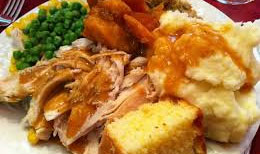Holiday Cooking: Good For The Soul; Bad For The Environment
November 24, 2013
It’s that time of year again. The holidays mean special times with family and friends, and lots of delicious food: turkey, gravy, buttery homemade desserts and yes, the potential for sanitary sewer overflows.
 It’s true; the holiday season comes with an increased possibility of pollution from costly sewer backups and overflows. During the holidays, when more cooks are preparing higher-fat-content foods such as deep-fried turkeys, the amount of fats, oils, and grease (FOG) entering into the ECUA sewer system increases, as does the potential for problems.
It’s true; the holiday season comes with an increased possibility of pollution from costly sewer backups and overflows. During the holidays, when more cooks are preparing higher-fat-content foods such as deep-fried turkeys, the amount of fats, oils, and grease (FOG) entering into the ECUA sewer system increases, as does the potential for problems.
When turkey fat and gravy are washed down the drain during cleanup of pots, pans and fryers, the fats and greasy scraps harden, and stick to the inside of sewer lines. This build up increases over time, especially in cold weather, and can cause clogs and potential overflows. Who wants that problem at a holiday gathering?
Fortunately, there are ways we can all make sure our kitchens don’t contribute to potential pollution, and avoid sewage backups in our homes and neighborhoods. Cooks should refrain from disposing of fatty substances such as lards/shortening, butter/margarine, food scraps, dairy products, batter and icing, salad dressings and sauces into a sink or drain.
If You’re Frying a Turkey this Year:
Deep-frying a turkey often leaves behind three to five gallons of used cooking oil. ECUA recommends the following steps be taken to safely dispose of used cooking oil:
- Let the oil cool completely. Pour it into its original container or another leak-proof container and label “Used Cooking Oil.”
- Take the used cooking oil to an ECUA Cooking Oil Disposal Station or call the ECUA for a free Residential Household Hazardous Waste collection.
- For smaller volumes allow the oil to cool and solidify. Scrape it into the trash. Hint: add kitty litter to the oil. The litter will absorb the oil and form clumps for easy garbage disposal. Avoid scented or disinfectant types of kitty litter as they can react with the oil and cause a fire.
Please don’t dispose of FOG by dumping it in the yard. This action is harmful to the environment when rain washes FOG residue into the storm drain, reaching local waterways without treatment.
Here are tips for a friendly FOG cleanup:
- Pour cooled FOG into a can with a lid and preferably recycle at an ECUA drop off site.
- If you can’t recycle your FOG, please dispose of it in your garbage can. Wipe down greasy pots, pans and dishes with a paper towel before washing.
- Dispose of the paper towel in the garbage, not in your recycling can.
- Don’t use hot water or the garbage disposal to wash fats down the drain. Water cools through the pipes, causing fats to harden into clogs further along in the sewer system.
- Drop off used cooking oil at following ECUA Disposal Stations:
Clean & Green
3303 North Davis Highway
Baskerville Donovan Engineering
449 West Main Street
ECUA at Ellyson Industrial Park
9255 Sturdevant Street
ECUA Sanitation Department
3050 Godwin Lane
ECUA Bayou Marcus Water Reclamation Facility
3050 Fayal Drive
Pensacola Beach on Via de Luna Drive
Between Pensacola Beach Elementary School and Our Lady of Assumption Catholic Church
NAS Pensacola (Military and Base Personnel ONLY)
Andrew Jackson Court
Fort Santa Maria de Galve Hase Road
Slemmer Avenue
Abb Street across from the Naval Survival Training Institute
Murray Street and Billingsley Street
Corry Field Housing at NAS Corry Station
For additional information visit the ECUA website www.ecua.fl.gov or call 476-0480.
Comments
One Response to “Holiday Cooking: Good For The Soul; Bad For The Environment”



It starts with family and friends arriving, bringing side dishes, helping in the kitchen and all the children playing outside in the clean fresh air. Then it happens, THE CALL….COME IN AND WASH UP…IT’S TIME.
Thanksgiving meal, family all together, the glorious smells emanating from the kitchen, wonderful conversation, table magnificently set with Holiday decorations, plates filled akin to the attached photo, Grace said but, remember the potential for SANITARY SEWER OVERFLOWS.” HMMMMM BOY LET’S EAT.
Brings a tear to you eye doesn’t it?